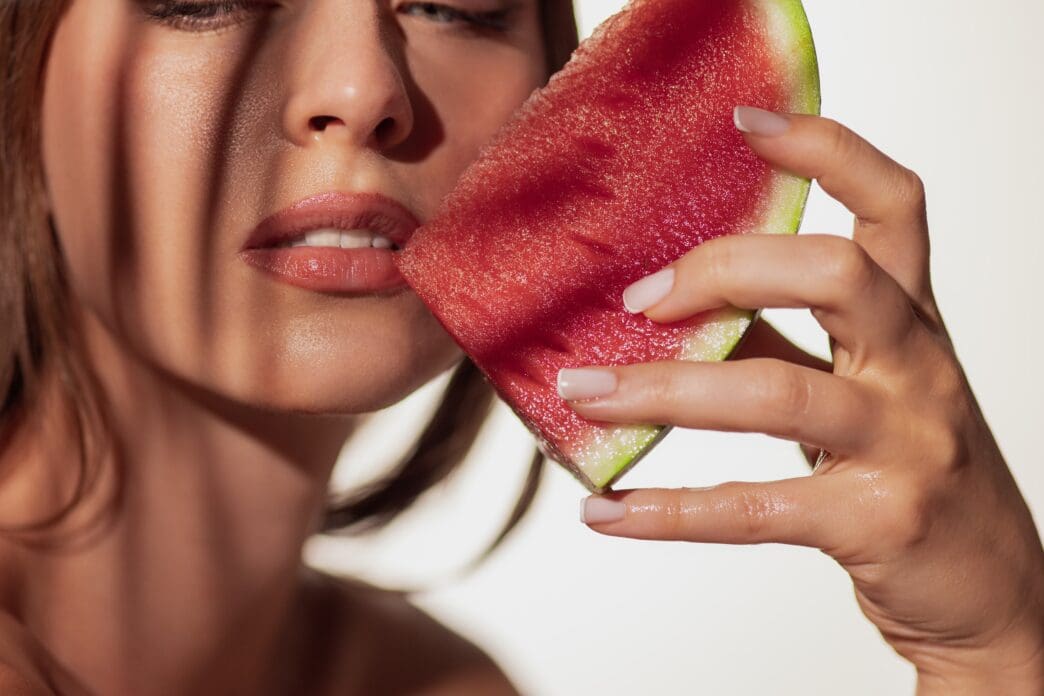A Quick Takeaway
- Your diet plays a crucial role in skin health, influencing hydration, elasticity, inflammation, and cellular repair.
- A balanced gut microbiome supports overall health and helps regulate systemic inflammation, which can manifest as skin issues.
- Complementing a nutrient-rich diet with hydration, stress management, quality sleep, and a supportive skincare routine creates a comprehensive strategy for achieving and maintaining a vibrant and healthy complexion.
The Story Behind the Trend
- A healthy diet is crucial for skin health, influencing hydration, elasticity, inflammation, and cellular repair, with nutrient-dense foods rich in antioxidants, healthy fats, and vitamins supporting natural defenses and a vibrant appearance; the “gut-skin axis” highlights the connection between gut health and skin, where a balanced microbiome reduces inflammation and prevents skin issues; key nutrients like antioxidants, healthy fats, and proteins are essential for protecting, moisturizing, and building the skin’s structure, while proper hydration is vital for maintaining elasticity and a smooth texture.
How to Make It Work for You
- Achieving healthy, glowing skin is fundamentally linked to dietary choices, with nutrient-rich foods playing a vital role in hydration, elasticity, and inflammation control, emphasizing the significance of a balanced diet for skin health. The gut-skin axis highlights the impact of gut health on skin, as a balanced microbiome and reduced inflammation—achieved through probiotic-rich foods—are crucial for preventing skin issues like acne and eczema, promoting clearer and healthier skin. Furthermore, limiting processed sugars, dairy, and unhealthy fats is essential to avoid glycation, inflammation, and potential skin problems, thus creating a comprehensive approach to achieving radiant skin through dietary choices and lifestyle habits.
The Community View
- The author believes that achieving radiant skin is fundamentally linked to dietary choices, emphasizing the importance of nutrient-dense foods rich in antioxidants, healthy fats, and essential vitamins to nourish the skin from within, support its natural defenses, and promote a vibrant appearance.
- The article highlights the “gut-skin axis,” emphasizing the importance of a balanced gut microbiome for skin health, and recommends consuming probiotic-rich foods and prebiotics to reduce inflammation and improve skin clarity.
- The author suggests that a holistic approach to radiant skin involves not only dietary choices but also lifestyle factors like hydration, stress management, adequate sleep, and a consistent skincare routine to complement the dietary efforts and achieve a truly vibrant complexion.
Achieving truly radiant skin extends far beyond topical creams and serums; it fundamentally begins with what you put on your plate. Your diet plays a pivotal role in skin health, influencing everything from hydration and elasticity to inflammation and cellular repair, making conscious food choices a powerful strategy for anyone seeking a glowing complexion. By prioritizing nutrient-dense foods rich in antioxidants, healthy fats, and essential vitamins, you can nourish your skin from within, supporting its natural defenses and promoting a vibrant, youthful appearance every day.
The Gut-Skin Connection
The intricate relationship between your gut and your skin, often referred to as the “gut-skin axis,” is a cornerstone of dermatological health. A balanced gut microbiome, teeming with beneficial bacteria, supports overall health and helps regulate systemic inflammation. When the gut is unhealthy, it can lead to increased permeability, allowing toxins and inflammatory compounds to enter the bloodstream, which can then manifest as skin issues like acne, eczema, and rosacea.
Nourishing your gut with probiotic-rich foods and prebiotics is therefore crucial for skin vitality. Fermented foods such as yogurt, kefir, sauerkraut, and kimchi introduce beneficial bacteria, while fiber-rich fruits, vegetables, and whole grains provide the prebiotics that these good bacteria feed on. This symbiotic relationship helps calm inflammation throughout the body, directly contributing to clearer, healthier, and more resilient skin.
Key Nutrients for Skin Health
Specific nutrients act as building blocks and protectors for your skin, each playing a unique role in maintaining its structure, function, and appearance. Understanding these essential components helps guide your dietary choices toward optimal skin health.
Antioxidants: Your Skin’s Defense Shield
Antioxidants are crucial compounds that combat oxidative stress, a process caused by free radicals that can damage skin cells and accelerate aging. Vitamins A, C, and E, along with minerals like selenium and zinc, are powerful antioxidants that protect skin from environmental damage, including UV radiation and pollution.
Vitamin C is essential for collagen synthesis, the protein that provides skin with its structure and elasticity, and also brightens the complexion. Vitamin E works in synergy with Vitamin C to protect cell membranes, while Vitamin A (in the form of beta-carotene) aids in cell turnover and repair. Selenium and zinc contribute to skin healing and immune function, reducing inflammatory responses.
Healthy Fats: The Foundation of Supple Skin
Omega-3 fatty acids are indispensable for maintaining skin barrier function, which is critical for locking in moisture and keeping irritants out. These essential fats help reduce inflammation, which can calm conditions like acne and psoriasis, and contribute to skin’s overall smoothness and elasticity.
Monounsaturated and polyunsaturated fats support healthy cell membranes, ensuring that skin cells are plump and hydrated. A diet rich in these beneficial fats helps prevent dryness, flakiness, and the appearance of fine lines, giving skin a more supple and youthful feel.
Proteins: Building Blocks for Structure and Repair
Protein is fundamental for skin health, as it provides the amino acids necessary for the production of collagen and elastin. These two proteins are responsible for skin’s firmness, elasticity, and ability to bounce back.
Adequate protein intake supports skin repair, wound healing, and the maintenance of a strong skin barrier. Without sufficient protein, skin can become dull, lose its firmness, and be more prone to damage and slower recovery.
Water: The Ultimate Hydrator
While not a nutrient in the traditional sense, water is arguably the most vital component for radiant skin. Proper hydration ensures that skin cells are plump and functional, maintaining elasticity and a smooth texture. Dehydration can lead to dull, tight, and flaky skin, emphasizing fine lines and wrinkles.
Water also aids in flushing toxins from the body, which can indirectly improve skin clarity and reduce breakouts. It supports nutrient delivery to skin cells and helps maintain overall cellular health, making it indispensable for a vibrant complexion.
Foods to Embrace for Radiant Skin
Incorporating a variety of these nutrient-dense foods into your daily diet is a delicious and effective way to cultivate healthy, glowing skin from the inside out.
Berries and Citrus Fruits
These vibrant fruits are packed with Vitamin C, a powerful antioxidant essential for collagen production and brightening skin tone. Berries like blueberries, strawberries, and raspberries also contain anthocyanins, another class of antioxidants that protect against cellular damage. Citrus fruits such as oranges, grapefruits, and lemons further boost your Vitamin C intake, helping to achieve a luminous complexion.
Leafy Greens
Spinach, kale, Swiss chard, and other leafy greens are nutritional powerhouses, rich in vitamins A, C, E, and K, as well as antioxidants like lutein and zeaxanthin. These nutrients protect skin from oxidative stress, reduce inflammation, and support healthy cell turnover. Their high water content also contributes to overall hydration.
Avocado and Nuts
Avocados are an excellent source of healthy monounsaturated fats, which keep skin moisturized and flexible, along with Vitamin E, an antioxidant that protects against free radical damage. Nuts like almonds and walnuts also provide Vitamin E, zinc, and omega-3 fatty acids, crucial for skin barrier function and reducing inflammation. These fats are key to maintaining a supple and smooth complexion.
Fatty Fish
Salmon, mackerel, sardines, and other fatty fish are rich in omega-3 fatty acids, which are vital for reducing inflammation and maintaining the skin’s natural oil barrier. Omega-3s help keep skin hydrated, plump, and less prone to conditions like acne and eczema. They also contain Vitamin E and zinc, further boosting their skin-protective benefits.
Whole Grains and Legumes
Whole grains like oats, quinoa, and brown rice, along with legumes such as lentils and chickpeas, offer complex carbohydrates that provide sustained energy and help stabilize blood sugar levels. This can prevent sudden spikes that contribute to inflammation and breakouts. They are also good sources of zinc and B vitamins, supporting skin repair and overall health.
Water and Herbal Teas
Consistent hydration is paramount. Drinking plenty of water throughout the day helps maintain skin elasticity and a plump appearance. Herbal teas like green tea, rich in catechins, offer additional antioxidant benefits that can protect skin from damage and reduce redness, contributing to a clearer and more even skin tone.
Foods to Limit for Skin Health
Just as certain foods nourish your skin, others can actively undermine its health and radiance. Reducing your intake of these items can significantly improve your complexion.
Processed Sugars and Refined Carbohydrates
Foods high in processed sugars and refined carbohydrates, such as white bread, pasta, pastries, and sugary drinks, cause rapid spikes in blood sugar. These spikes can lead to a process called glycation, where sugar molecules attach to proteins like collagen and elastin, making them rigid and brittle. This accelerates skin aging, leading to wrinkles and a loss of firmness, and can also exacerbate inflammatory skin conditions.
Excessive Dairy
For some individuals, dairy products can trigger skin issues, particularly acne. Hormones present in milk, as well as its potential to increase insulin-like growth factor 1 (IGF-1), may stimulate oil production and inflammation in the skin. While not universally problematic, observing your skin’s reaction to dairy can be insightful.
Fried and Processed Foods
Foods high in unhealthy fats and additives, often found in fried foods, fast food, and highly processed snacks, can promote systemic inflammation. This inflammation can manifest as breakouts, redness, and a dull complexion. These foods often lack beneficial nutrients, further compromising skin health.
Beyond the Plate: Lifestyle Factors for Glowing Skin
While nutrition is a cornerstone, a holistic approach to radiant skin also incorporates several key lifestyle habits that work in tandem with your diet.
Hydration
Beyond the water you get from food, consistent water intake throughout the day is non-negotiable. Aim for at least eight glasses of water daily to keep your skin cells plump, your complexion clear, and to aid in the detoxification process. Hydrated skin is more resilient and appears more youthful.
Stress Management
Chronic stress can wreak havoc on your skin by increasing cortisol levels, which can trigger oil production, inflammation, and exacerbate conditions like acne, eczema, and psoriasis. Incorporating stress-reducing practices such as meditation, yoga, deep breathing exercises, or spending time in nature can significantly improve skin health.
Sleep
Adequate sleep is when your body, including your skin, repairs and regenerates. During deep sleep, blood flow to the skin increases, and collagen production is boosted, helping to repair daily damage. Aim for 7-9 hours of quality sleep per night to allow your skin to recover and rejuvenate, resulting in a fresher, more vibrant appearance.
Skincare Routine
A consistent, gentle skincare routine complements your dietary efforts. Cleansing, moisturizing, and protecting your skin with SPF are fundamental steps that shield your skin from environmental aggressors and maintain its integrity. Choose products that suit your skin type and address specific concerns without harsh chemicals.
Cultivating radiant skin is an inside-out endeavor, deeply rooted in the nourishment you provide your body. By consistently choosing a diverse array of nutrient-rich foods, particularly those packed with antioxidants, healthy fats, and essential proteins, you empower your skin’s natural ability to repair, protect, and glow. Complementing these dietary choices with adequate hydration, stress management, quality sleep, and a supportive skincare routine creates a comprehensive strategy for achieving and maintaining a truly vibrant and healthy complexion.







